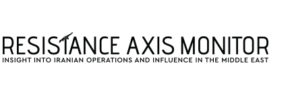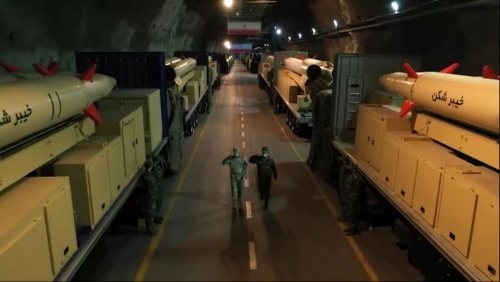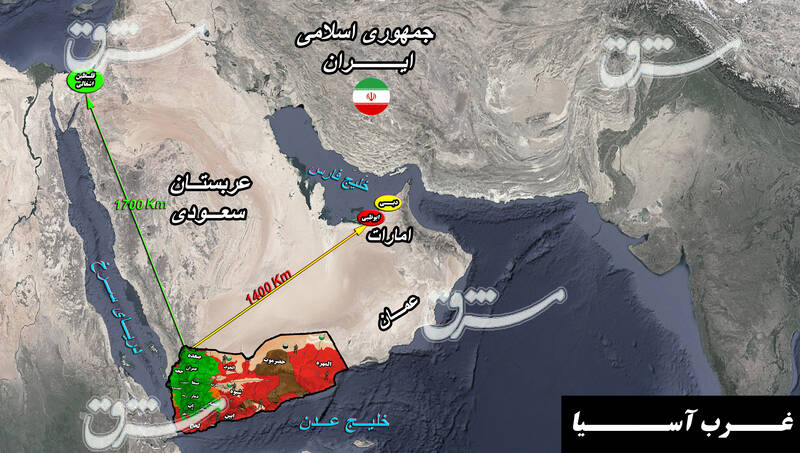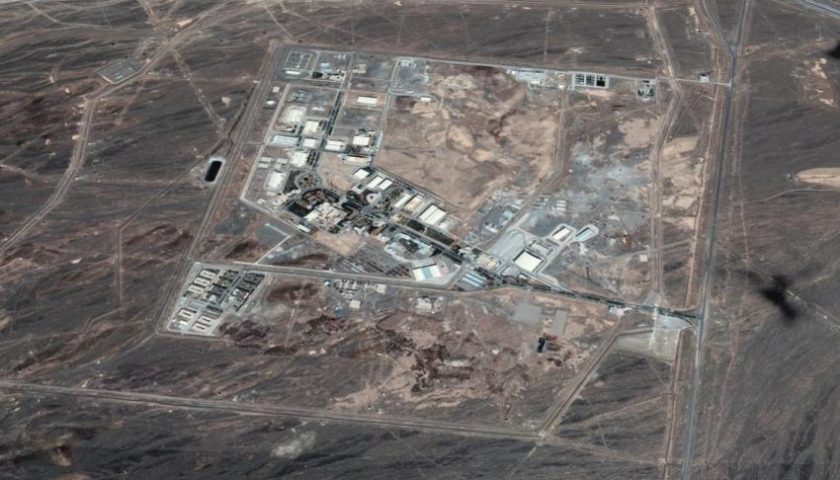Iran
In New Year Address, Khamene’i Reiterates Demands For US To Lift ‘All Sanctions’ Before Tehran Returns to JCPOA On 21 March, Supreme Leader Ayatollah Ali Khamene’i delivered a televised address for Iranian New Year before an empty audience due to COVID-19. He said that Tehran was in no rush to return to the Joint Comprehensive Plan of Action (JCPOA), also known as the Iran nuclear deal. He stressed that the Islamic Republic’s policy was clear in that the US would have to lift “all sanctions” before Iran returns to full compliance. Khamene’i said that Tehran does not trust the US in light of events in the past six years. He added that if JCPOA terms were to change, they should change in Tehran’s favor because it is stronger, and the US is weaker than when JCPOA was signed in 2015. He said Islamic Republic officials should assume that sanctions would continue into the next executive administration. Presidential elections are due in June. He called on officials to focus on making sanctions “ineffective.”
Elsewhere in the address, Khamene’i discussed the importance of presidential elections in Iran. He said the next administration should be “competent, faithful, seek justice, against corruption, have revolutionary and jihadi actions, believe in internal capabilities, believe in youth, be popular, hopeful in future, and capable of managing problems.” He continued that “some say the president has no power,” which is “against reality.” He added “these [statements] come from lack of responsibility, lack of awareness, or, God forbid, out of spite.” The Supreme Leader accused US and Israeli “spy agencies” of “trying to reduce participation” in the elections and make accusations that “elections are engineered…[to make] people [feel] hopeless that ‘your vote does not matter and has no effect on improving” things.
Khamene’i added that the “enemy” uses “cyber space” in order to advance such goals. “All countries of the world manage their cyber space, but we are proud that we have let it go!” He continued, “cyber space must be managed…it is very good that people use it as a tool for freedom…but it must not be a tool at the hands of the enemy so that they can act against the country and conspire against the nation.” (Office For the Preservation and Publication of the Works of Grand Ayatollah Khamene’i)
Khamene’i Declares Motto of Next Calendar Year: ‘Production; Support; Removing Obstacles’ The Supreme Leader declared the motto of the year 1,400 in the Solar Hijri Calendar to be “Production: Supports; Removing Obstacles.” In a short address to mark the new year released on 20 March, he said that while domestic production in the last year was “acceptable,” there were still gaps and obstacles, which included “traitorous smugglers” as well as red tape and lack of proper support from the government. He said “acceleration” in production could increase popular satisfaction. (Office For the Preservation and Publication of the Works of Grand Ayatollah Khamene’i)
Mohammad Resigns as IRGC Engineering Arm Director To Run For President, While Also Appointed as Adviser to IRGC Chief On 7 March, Sa’eed Mohammad announced via Twitter his resignation as director of IRGC Khatam ol-Anbiya Construction Base to run for elections this year, because holding the post while running for office would reflect negatively on “sacred institution” of the IRGC. Rumors of his run for president have been swirling for some time. Some news agencies initially reported that Mohammad was “removed,” which were later change to resignation. Thanking Mohammad’s tenure that started in 2018, IRGC chief commander Hossein Salami also appointed Mohammad as his “adviser,” according to press reports that carried Salami’s statement.
Iranian Students News Agency (ISNA) published a statement by Hamid-Reza Taraqi, member of the traditional-conservative Islamic Mo’talefeh Party, that Mohammad was removed due to “violations.” Taraqi, however, later tweeted denying that he made the statement, saying the accusations against Mohammad show rivals’ “fear” of “young, revolutionary and jihadi” candidates. ISNA responded that it has the tape of Taraqi making those remarks. Then, Taraqi walked back his denial, saying that ISNA had not misrepresented his statements, but that “some news agencies” had misrepresented the article and interview, saying that he made the remarks “based on analysis of some news events,” and that Mohammad clarified the matter by saying he resigned and wasn’t removed. Taraqi apologized to Mohammad.
Mohammad’s replacement in Khatam ol-Anbiya is Hossein Houshi-Sadat, whose previous post included IRGC engineering and passive defense deputy. (Twitter, Asr-e Iran, Hamshahri, ISNA, Twitter)
Vahidi Warns Arab States Against Forming ‘Coalition’ With Israel On 3 March, Ahmad Vahidi, former Qods Force chief and current National Defense University director, warned “if Saudi Arabia, Emirates, and Bahrain enter a coalition with Zionist regime against Iran, they will receive very strong and massive hits.” He made the remarks following a senior Israeli official saying that it and the aforementioned Arab states were exploring a security arrangement. (Mehr News)
Qods Force Chief Meets With Trustee of Imam Reza Shrine in Mashhad On 17 March, Qods Force chief Esma’il Qa’ani met with Hojjat ol-Eslam Ahmad Marvi, trustee of the Reza Holy Precinct, a foundation that oversees with the Imam Reza Shrine in Mashhad. Marvi praised Qa’ani as “trusted” by his predecessor Qasem Soleimani. Marvi continued that Qa’ani’s appointment “hours after [Soleimani’s] martyrdom showed that the flag of fighting Arrogance [West], Zionism, and their little hands [regional allies] will not fall. Today, any free human who opposes oppression, bullying, plunder, and violence stroking by America and its bandit allies is in reality a member of the sacrificing and proud Qods Force of the army of Islam,” Marvi continue. Qa’ani thanked Marvi and discussed “the daily conquests and successes of the Resistance Front,” according to a transcript of the meeting. (Alef)
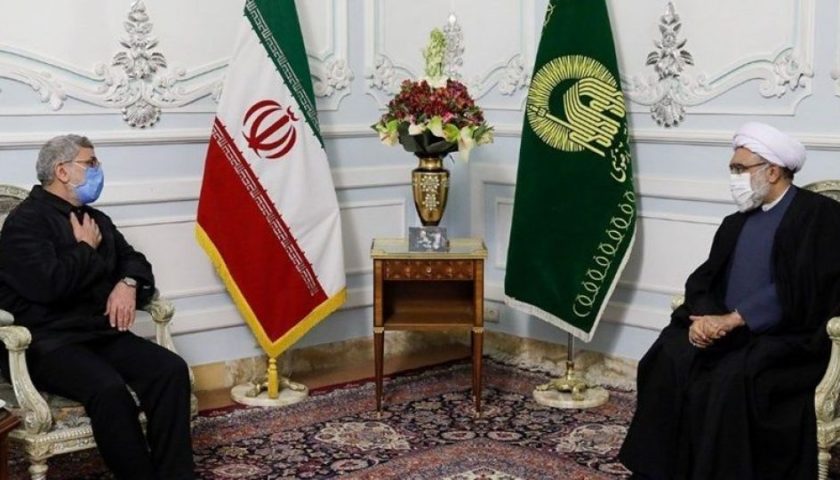
Basij Paramilitary Chief Announces New Ten-Year Plan For ‘Modern Basij’ On 15 March, IRGC Organization for the Mobilization of the Oppressed (Basij paramilitary) chief Gholamreza Soleimani has announced that the Supreme Leader recently signed off on a 10-year plan for “modern Basij to fulfill goals of Second Step [of Revolution promulgated by Khamene’i in 2019].” The “most important part” of the plan is “teaching and training…both in the Basij and also in society,” Soleimani continued, “the mission of the Basij is implementing the system’s software [ideology and values].” He added that the training plan covers “from children to final years of life.” (Tasnim News)
New Appointments in Basij Paramilitary On 1 March, IRGC chief Hossein Salami introduced Brigadier General Qasem Qoreyshi as IRGC Basij paramilitary deputy commander. Qoreyshi was previously coordination deputy of Supreme Leader’s Representation in the IRGC. Qoreyshi’s predecessor, Mohammad-Hossein Sepehr, has been appointed chief of the Armed Forces General Staff Conscripts Training Center Base. Salami also appointed Brigadier General 2nd Class Majid Khorasani as Basij coordination deputy. Khorasani was previously IRGC Cooperatives Foundation managing director, and his other posts including the foundation’s deputy managing director, and Basij Construction Organization director. Khorasani’s predecessor, Na’man Gholami, has been appointed IRGC Imam Hossein University director. (IRIB)
Conference Held on ‘Describing Supreme Leader’s Guidance About Karabakh’ On 1 March, a conference sponsored by the Seminaries Management Center was held on “Describing the Supreme Leader’s Guidance About Karabakh.” The conference was called “The 17 Rabi’ Discourse,” referring to the Islamic calendar date (3 November 2020) when the Supreme Leader expressed his public support of Azerbaijan in the latest conflict against Armenia in Karabakh.
The conference issued a statement that called Khamene’i’s statement “the most superior discourse” on the conflict “in the world.” The conference reiterated Tehran’s support of Azerbaijan, and opposed “the presence and intervention of foreign forces…and the Zionist enemy.” The statement also criticized “some countries” for “spreading Iranophobia and anti-Shiism” to damage relations between Iran and Azerbaijan. The conference warned that the presence of “takfiri forces” and “lying Zionist regime” in the conflict would mark “a new conspiracy” in the region. The conference furthermore declared clergy and seminary support of Azerbaijan. The statement requested Baku to take “appropriate steps” about “takfiri forces” and “Zionist regime elements.” It furthermore called to expand bilateral ties between Iran and Azerbaijan. (Shia News Association)
Previously Unreleased Video of Khamene’i First Meeting With IRGC Commanders Released Coinciding with Guardsman Day, Iranian media published a previously “unreleased” video of Supreme Leader Ali Khamene’i meeting with IRGC commanders for first time upon becoming Supreme Leader in 1989. In the video, Khamene’i stressed that he opposed merging the IRGC with the Army (Artesh), and that he considered a strong IRGC vital for “defending the revolution.” He also discussed how he had met with most of the commanders present in the meeting, who are not shown in the video, in his previous official capacities (Khamene’i’s posts included President). The video was circulated on popular pro-IRGC social media channels. (Hamshahri)
Sobh-e Sadeq Raises Alarm About Western Influence Over Iranian Generation Z On 15 March, IRGC weekly Sobh-e Sadeq published an editorial saying, “we must accept that a significant part of our country’s youth are active in cyber space, which is built and cultivated by America and other Western countries that oppose the Islamic Revolution. Therefore, a significant portion of the Iranian Generation Z’s upbringing is at the hands of the enemy, and we must think about a solution to overcome and confront the threat ahead!” (Sobh-e Sadeq)
Sobh-e Sadeq Front Page Sharply Criticizes Ahmadinejad On 15 March, IRGC Political Deputy Yadollah Javani published an editorial on the front page of IRGC weekly Sobh-e Sadeq titled “sympathetic conversation with supporters of [former president Mahmoud] Ahmadinejad.” He tells working class who believe that Ahmadinejad was only one to address their issues that former president’s previous success was owed to “those” in his admin who worked “day and night” but currently have become his “main critics” because of “his movement in incorrect path.” Javani divides rest of Ahmadinejad supporters to those who only want power, and those who “still imagine that Mr. Ahmadinejad is a revolutionary…force who follows line of Imam and Supreme Leader.” Javani admonishes them that Ahmadinejad today is not the one imagined in 2005. (Sobh-e Sadeq)
Iraq
Iran State Media Echo Reports of Formation of New Unit In Iraq That Claimed Attacks on US Islamic Republic state media and particularly IRGC-linked news agencies like Mashregh News have echoed reports of formation of Kheybar Brigade in Iraq that on 17 March claimed recent attacks against “convoy and base of American military forces inside Iraq.” Mashregh News added that “a number of resistance groups in Iraq have announced formations after the cowardly assassinations of [Qasem Soleimani and Abu Mahdi al-Muhandis by US in 2020], and announce their goals to be the exit of occupying American forces from their country.” (Mashregh News)
Khamene’i Deputy, Sobh-e Sadeq Praise Sistani For Raising Palestinian Issue in Meeting With Pope In an address to Iranian cultural attache officials on 10 March, Hojjat ol-Eslam Mohsen Qomi, Office of Supreme Leader International Communications deputy, praised Grand Ayatollah Ali Sistani for calling “honorable Jerusalem occupied” in meeting with the Pope, saying that Sistani undermined “conspiracy to normalize relations with the Jerusalem-occupying regime.”Qomi added, “the great leader of Islamic Revolution [Khamene’i] said in past years that Ayatollah Sistani shines in Najafi.” Qomi expressed hope that “obstacles to cooperation between Islam, Christianity including Islamophobia and anti-Shiite policies in West” would be overcome.
On 9 March, IRGC weekly Sobh-e Sadeq published an editorial that praised Sistani’s message about “oppression and poverty…especially in Palestine.” Editorial pushes back against narrative that papal visit strengthened Najaf v. Qom, saying that interfaith meeting doesn’t mean “accepting dominance-seeking of super powers,” which the editorial said has been stressed by Sistani w/ regards to Palestinians. (IRNA, Sobh-e Sadeq)
Iraq: Iran’s competing power centres are creating havoc in the country According to sources cited by Middle East Eye, different armed and political factions in Iraq have tied themselves to different power centers in the Islamic Republic following the death of Qods Force chief Qasem Soleimani (note: Resistance Axis Monitor does not endorse the news agency’s description of the Supreme Leader’s Office as an intelligence agency). One key player cited by the report is Asghar Hejazi, the Supreme Leader’s security deputy. (Middle East Eye)
Lebanon
Hizballah Secretary-General Hassan Nasrallah Addresses Worsening Lebanese Crisis Hizballah’s Secretary-General Hassan Nasrallah addressed Lebanon’s worsening economic crisis during his March 18, 2021 speech. Nasrallah’s diagnosis purported to absolve his group of all blame for the country’s deterioration, instead blaming a combination of decades of bad fiscal and economic policies by successive Lebanese governments, Israeli wars on Lebanon, and, primarily, U.S. regional policies, “particularly the existential war the US waged against Syria.” He repeated his group’s longstanding claims that the United States was intentionally exacerbating Lebanon’s crisis through preventing the entry of dollars into Lebanon, sanctions on the banking sector, preventing other countries from aiding Beirut, and the U.S. Embassy in Beirut stoking social strife – in which he included the October 17, 2019 anti-corruption uprising. Nasrallah ended his speech by saying Hizballah preferred working through the Lebanese State apparatus to rescue the country, but would exercise its own “options” in case of the country’s total collapse. (Al-Manar Television).
Hizballah Delegation Visits Moscow The head of Hizballah’s Loyalty to Resistance bloc, MP Mohammed Raad, met Monday in Moscow with Russian Foreign Minister Sergey Lavrov. “The meeting with Russian Foreign Minister Sergei Lavrov was a meeting between friends and the atmosphere of the discussions was frank,” Raad said after the talks. “We discussed the situations in the region and Lebanon, and means to consolidate stability and strengthen the achievements that were made through combating terrorism in Syria and Lebanon,” Raad added. Talks also explored “what Russia can do to support friendly peoples in the region, especially in Lebanon,” the top Hizballah lawmaker went on to say. He also discussed with Lavrov “the governmental situation in Lebanon and Hizballah’s recognition of the need to speed up the government’s formation in a manner that reflects the Lebanese people’s will.” Raad added that “this is the key to stability and the start of solutions.” (Naharnet, Al-Ahed, Al-Jadeed)
Syria
Two IRGC Members Including Special Forces Officer Killed in Eastern Syria On 16 March, Iranian media announced that Islamic Revolution Guard Corps (IRGC) members Mojtaba Barsanji and Mehdi Bakhtiari died following a “mine explosion” in the vicinity of al-Mayadin, eastern Syria.
State media Islamic Republic of Iran Broadcasting (IRIB) reported that 27-year old Barsajani was a member of the Qods Force, the IRGC’s external operations branch. A photo of Barsanji in uniform showed him the rank of Third Lieutenant, alongside a number of special forces insignia including Karate, Mountain Trainer, Paratrooper Rank 3, as well as Ranger tab. IRGC-linked Fars News published a photo of Barsanji with former Qods Force chief Qassem Soleimani, reporting that it was taken in 2016 during Soleimani’s visit to Babol, Mazandaran, during a meeting with families of Guard Corps personnel killed in the infamous ambush at Khan Touman, Aleppo Governorate, in May of that year.
Funerals were held for the pair in their home provinces. In Savadkuh County of Mazandaran Province, from which Barsanjani is from, a photo on his casket carried the following writing, “Imam Ali Special Forces Unit, Malek Ashtar Special Forces Command Center.” That is IRGC Ground Forces Special Forces unit, contradiction earlier report in state media that he was in the Qods Force. Bakhtiari was buried in his hometown of Eslamshahr, outside the capital in Tehran Province. The media reported that Qods Force chief Esma’il Qa’ani visited Bakhtiari’s family on 19 March. His exact unit affiliation in the IRGC was not immediately clear. (ABNA, IRIB, Mehr News, Fararu)
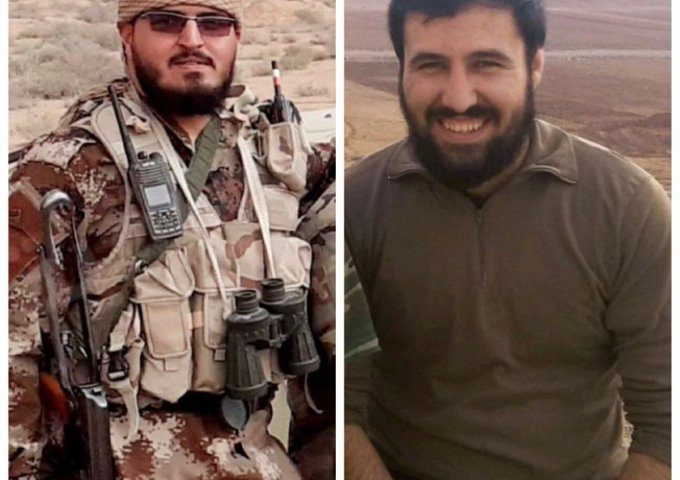
Left: Mojtaba Barsanji; Right: Mehdi Bakhtiari 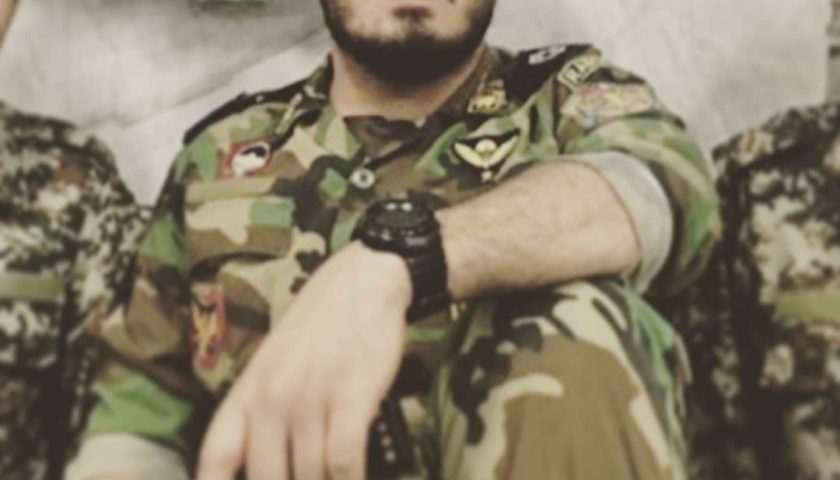

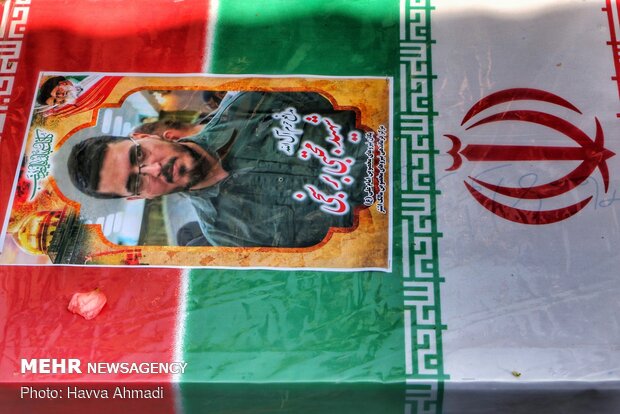

Israel Conducts Airstrike in Syria Israel carried out yet another airstrike in Syria on March 18, 2021. According to the Syrian Arab Army, “At 22:35 today, the Israeli enemy carried out an aggression from the direction of the occupied Syrian Golan Heights aimed at several targets around Damascus. Our aerial defenses intercepted the missiles of the aggression and shot down most of them. The attack resulted in material damages only.” The SAA’s casualty claims could not be independently verified, and Israel’s general policy is to remain silent on such strikes, including their intended targets. (Syrian Arab News Agency)
Iran House of Innovation and Technology Exports Opens in Damascus On 3 March, Iran House of Innovation and Technology Exports opened in Damascus. Vice President for Science and Technology Sorena Sattari was leading a delegation reportedly constituted by reps from 40 knowledge-based Iranian companies. (ISNA)
Al-Arabiya: Assad Probably Contracted Coronavirus From Iranian Delegation On 9 March, expatriate Iran International citing Al-Arabiya reported a member of the Iranian delegation led by Sattari “most likely” gave COVID-19 to Syrian President Bashar al-Assad. (Iran International)
Velayati Receives New Syrian Ambassador to Iran, Passes Along Khamene’i’s Well Wishes to Assad On 15 March, the Supreme Leader’s top foreign policy adviser Ali Akbar Velayati hosted the new Syrian Ambassador to Iran Shafiq Dayub. Velayati said that the Supreme Leader tasked him to pass along a “greetings message” to Syrian President Bashar al-Assad, whom Khamene’i considers “a great leader. Velayati called Assad “strong and courageous” who “played a very valuable and important role in preserving Syria’s independence against enemies and conspiracies during 8 years of unequal war imposed by regional and international criminals.” Velayati called Syria “one of the pillars of the Resistance Axis,” adding that bilateral cooperation “is growing and strategic.” He also announced Tehran was ready to dispatch a medical team to visit Assad in Damascus. Dayub thanked Tehran’s support and Khamene’i’s message. (Hamshahri)
Yemen
Khamenei, IRGC Spokesman Hint at Iranian Support of Ansarallah On 11 March, Supreme Leader Ayatollah Ali Khamene’i said, “the Yemeni people are very talented…by using certain phenomenon, they were able to create defensive weapons, or produce or build themselves, and answer the bombardments of these six years.”
On 19 March, IRGC Spokesman Ramezan Sharif also said “Yemenis had missile base because they were part of the Eastern block, but rulers’ betrayal…stopped fighters. With time and aid of some countries, fighters were able to upgrade their weapons, and today we see power balance in favor of Yemenis.” (Office For the Preservation and Publication of The Works of Grand Ayatollah Khamene’i, Mashregh News)
Qa’ani Praises Ansrallah For Stepped Up Operations Against Saudis On 13 March, Qods Force Commander Esma’il Qa’ani delivered an address in Mashhad commemorating “martyrs” of Kheybar and Badr operations during the Iran-Iraq War. “What these [Yemeni] youth have done in the war…has no equal in military battles of the modern era. In the current Ma’rib battle [in central Yemen], the trend of battle is inch by inch like Karbala 5 [failed siege of Basra in 1987 during Iran-Iraq War].” He added, “despite these attacks, in the past 10 days, Yemenis in the past 10 days have implemented 18 extraterritorial operations against Saudi regime government and economic centers including Yemenis targeting Damam oil facility on the shore of Persian Gulf. Despite Saudis’ denial, we witnessed increase in oil prices.” He called Yemeni fighters “students of the school of martyrdom, and that [our role model] has had influence across the world. (IRNA)
Huthis Allege Saleh, CIA Collusion with AQAP Yemen’s Ansarallah movement alleged in a report on its Al-Masirah television channel that the United States had colluded with Al-Qaeda in the Arabian Peninsula through its ties with former Yemeni President Ali Abdullah Saleh. Al-Masirah claims to have obtained what it alleged were “secret documents” and a recording of a phone call between Saleh and former Central Intelligence Agency Director George Tenet proving these claims. The documents and phone call were released by Ansarallah’s “Moral Guidance Department,” and purport to demonstrate ties between the CIA and Al-Qaeda. The movement claims that during the alleged Saleh-Tenet phone call, the former CIA Director called for the release of a senior Al-Qaeda operative detained in Yemeni prisons for involvement in the October 12, 2000 U.S.S. Cole bombing.
The report was amplified by other Resistance Axis outlets and leaders. Iran’s Arabic-language Al-Alam TV carried the report, and Hizballah Secretary-General Hassan Nasrallah mentioned it in his March 18 speech as proof of American attempts to destabilize the region.
Pro-Hezbollah Al-Mayadeen quoted Abdul Qader al-Shami, the director of the Houthi-controlled Political Security Office, saying Tenet was trying to secure the release of dual U.S.-Yemeni national Anwar al-Awlaqi. However, Alwaqi only traveled to Yemen in 2004. A long-standing fixture of the Resistance Axis’ propaganda narrative is that the United States creates, supports, and nurtures Sunni jihadist groups to create regional instability and an excuse for U.S. intervention and regional control. (Al-Masirah, Al-Mayadeen, Al-Alam, Al-Manar)
Ansarallah Strike Saudi ARAMCO Oil Facilities in Riyadh Yemen’s Ansarallah movement claimed responsibility for a drone strike on Saudi Arabia’s ARAMCO oil fields, located in the Saudi capital of Riyadh. The Houthis claimed the strike was carried out with six drones. Saudi sources confirmed the strike on oil refineries, but said that the attack had resulted in material damage only. (Al-Masirah, Al-Mayadeen, Hezbollah Military Media, Syrian Arab News Agency)
